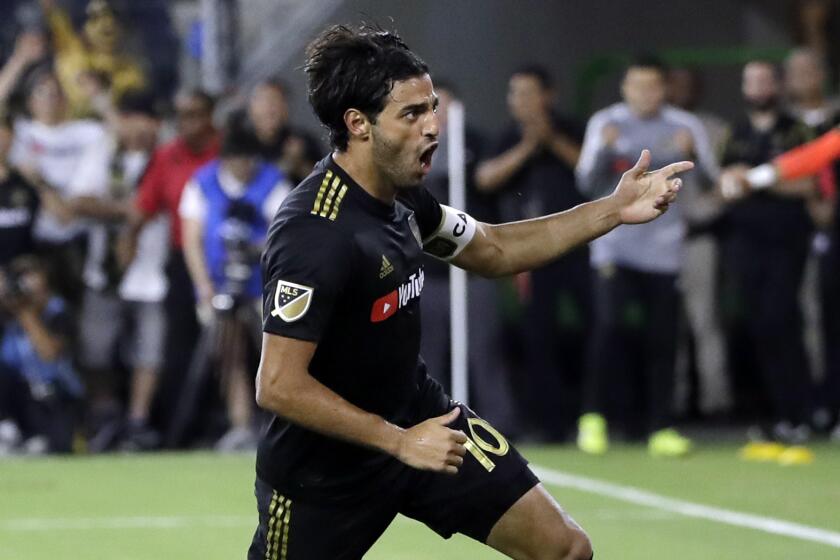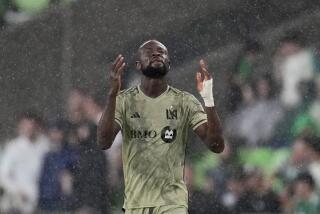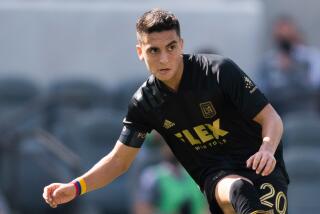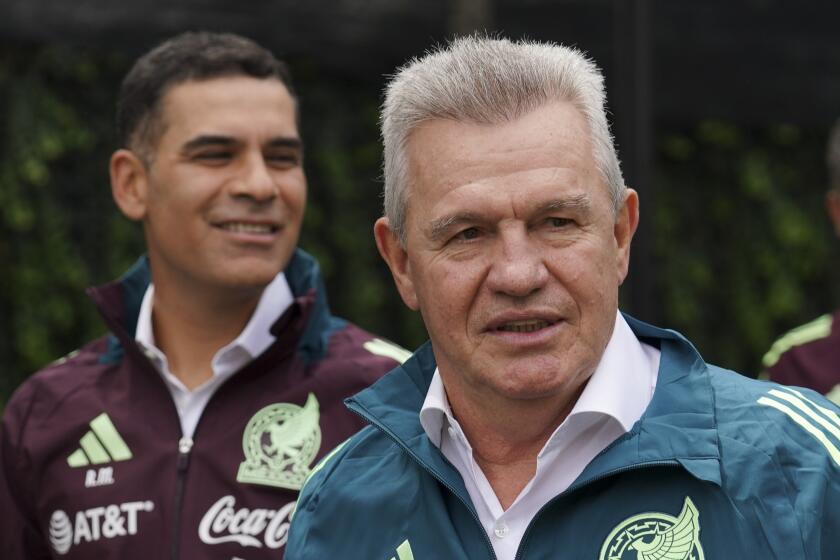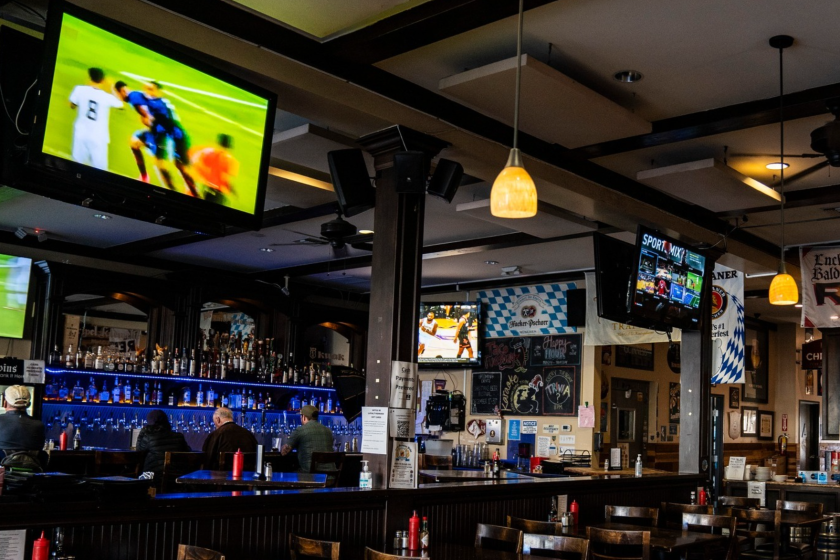Column: Tim Howard, whose career is likely to end Sunday, will retire as the best U.S. goalkeeper ever
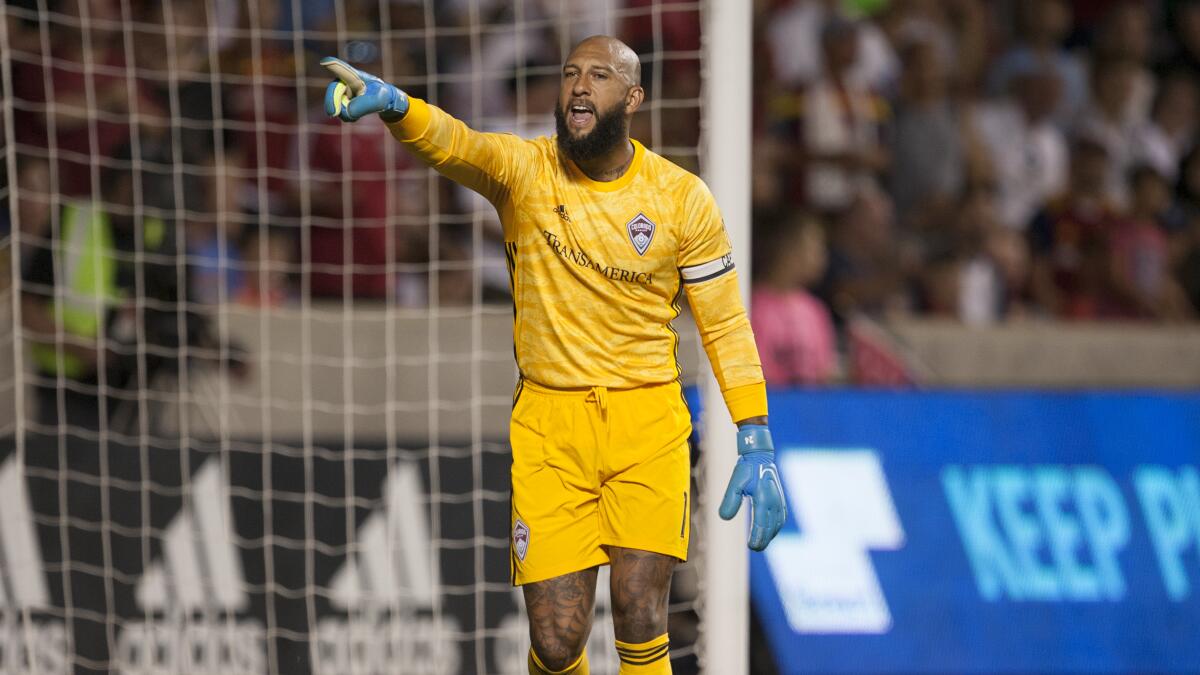
Few goalkeepers have made more saves than Tim Howard.
In 13 Premier League seasons with Manchester United and Everton, he turned away the likes of Wayne Rooney, Frank Lampard and Sergio Aguero. In 2014, he frustrated Belgium’s Kevin De Bruyne and Eden Hazard en route to a World Cup-record 15 saves in a knockout-round match.
But he couldn’t stop Father Time. So barring a series of unlikely results, Sunday afternoon’s game against LAFC at Banc of California Stadium will be the last of Howard’s stellar career.
“I would love to play until I’m 80, but that’s not the way this works,” the Colorado Rapids goalkeeper said.
“My body tells me otherwise.”
So does his body of work, which shows Howard, 40, heading into retirement as the greatest goalkeeper in U.S. history. No American keeper has more national team appearances (121), starts (119) or wins (62) than Howard. Only Kasey Keller, with 47 shutouts, has more than Howard’s 42.
LAFC is set for the playoffs but will be chasing team and individual records in its finale, while the Galaxy can improve their fate dramatically with a win.
You want stamina? Sunday’s game will be his 815th for club and country over the last 22 years, about one every 10 days. You want longevity? Howard and Houston’s DaMarcus Beasley, who will retire following Sunday’s game against the Galaxy, are the only men to play for the national team in 16 calendar years.
You want records? No Everton player has made more English Premier League appearances than Howard’s 354, and only Brad Friedel, among Americans, has played more games in England.
Howard also made three all-star teams in MLS and one in the EPL and was twice named U.S. Soccer athlete of the year. It wasn’t so much a career as it was a legacy.
“I’d say he’s the best in history so far,” LAFC keeper Tyler Miller said.
Added LAFC coach Bob Bradley, who coached Howard with the New York MetroStars and U.S. national team: “I have great respect for Tim [and] everything he’s accomplished in his career. Whenever a player like that gets to the end, you just want to make sure that people show the respect for not only what they did on the field but just how they carried themselves.”
And Howard certainly carried himself like a champion despite personal difficulties, some of which he details in the 2014 biography “The Keeper: A Life of Saving Goals and Achieving Them.”
His father left when Howard was just a toddler, leaving him and an older brother to be raised by a single mother in New Brunswick, N.J. At 12, he was diagnosed with obsessive-compulsive disorder (OCD) and Tourette syndrome, a disorder that involves repetitive movements or unwanted sounds that can’t be easily controlled, behavior for which other children mocked him.
Yet by 24 he had worked his way into the starting lineup for Manchester United — only to make a blunder on a free kick that cost the team a Champions League game and led to his banishment to Everton.
There he became a star.
Sign up for our weekly soccer newsletter >>
“He’s had a lot of ups and downs, and he’s dealt with a lot of adversity throughout his career,” Miller said of Howard, with whom he would like to swap jerseys Sunday. “Sometimes the positions of goalkeeper is the hardest when you feel like you’re on your own and you’re isolated.”
While his performance on the field is quantifiable, what he’s done off the field to comfort and assure people struggling with Tourette syndrome can’t be measured so easily. But it undoubtedly led to some of his biggest saves, inspiring MLS to name him humanitarian of the year and the U.S. Tourette Syndrome Assn. to dub him the “most notable individual with Tourette syndrome around the world.”
Last season was one of Howard’s toughest, though. After surrendering an MLS career-high 58 goals for a dismal Colorado team, he did some offseason soul searching and decided to make this his final season.
“I’m very much at peace with it,” he said. “This will probably all hit me when the dust settles. The end of the season and the cleaning out a locker is normal. It’s going to be next year when the season starts and I’m not there.
“I’ve had 22 seasons that have begun and ended. I think the hard part will be when it doesn’t begin again.”
As for memories, Howard said he has too many to count.
“I probably look at my best soccer memories and take it phase by phase. Each team I played for, there’s probably a singular moment that stands out for me,” he said. “The first time I stepped on the field for my country was very special back in 2002. Obviously the Belgian game in the World Cup.
“I’ve had big special [moments] along the way, so it’s hard to pick just one.”
Howard said he has managed his finances well and doesn’t have to work a day in retirement. But he will, continuing his job as soccer analyst for Turner Sports — something he does almost as well as he tends goal — and focusing on his work with Memphis 901, the USL Championship team of which he is a minority owner. (He also has an ownership stake in Dagenham & Redbridge, a fifth-tier club in England.)
“An executive role in a club is something that ultimately I want to do. That’s what makes me happiest and pushes me the most,” he said. “Me being idle isn’t a good thing. I need to be busy.”
There is a shot — albeit it a long shot — that Colorado could extend Howard’s career a couple of more weeks. With a win over LAFC, a Dallas loss to Kansas City, and a Portland victory over San Jose, the Rapids could make the playoffs.
“It’s exciting to be able to play for something at the end of the season,” he said.
As for his legacy, Howard said he’s proud of what he’s accomplished. But just as time caught up with his body, it’s only a matter of time before someone catches up to his records too.
“That was always what I set out to do: to have longevity in this game and to be the best. I’ve set those records, and I feel like I’m on top,” he said. “But I’m only the custodian of that. There will be someone that comes after me —whether immediately or in decades — that will surpass those records.
“And that’s what they’re there for.”

